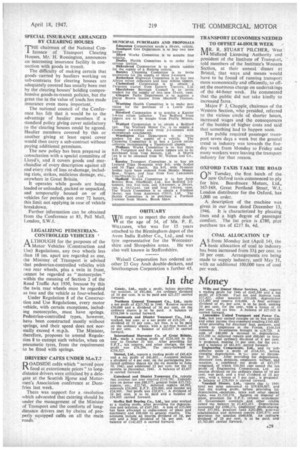SPECIAL INSURANCE ARRANGED BY CLEARING HOUSES
Page 31

If you've noticed an error in this article please click here to report it so we can fix it.
THE chairman of the National Conference of Transport Clearing Houses, Mr. H. Rossington, announces an interesting insurance facility in connection with goods in transit.
The difficulty of making certain that goods carried by hauliers working on sub-contracts for clearing houses are adequately covered has usually been met by the clearing houses' holding comprehensive goods-in-transit policies, but the great rise in the value of loads has made insurance even more important. '
The national council of the Conference has felt that it would be to the advantage of haulier members if a standard policy giving cover satisfactory to the clearing houses could be agreed. Haulier members covered by this or another giving at least equal cover would then carry a sub-contract without paying additional premiums.
The new policy has been prepared in consultation with a special committee of Lloyd's, and it covers goods and merchandise of every description against all and every risk of loss or.damage, including riots, strikes, malicious damage, etc., anywhere in Great Britain.
It operates while goods are being loaded or unloaded, packed or unpacked, and temporarily housed on or off vehicles for periods not over 72 hours, this limit not applying in case. of vehicle breakdown.
Further information can be ,obtained from the Conference at 83, Pall Mall, London, S.W.1.
LEGALIZING PEDESTRIANCONTROLLED VEHICLES ' A LTHOUGH for the purposes of the PA Motor Vehicles '(Construction and Use) Regulations, any two wheels less than 18 ins, apart are regarded as one, the Minister of Transport is advised that pedestrian-controlled vehicles with two rear wheels, plus a twin in front, cannot be regarded as " motorcycles " within the meaning of Section 2 of the Road Traffic Act 1930, because by this the twin rear wheels must be regarded as two and the vehicle as four-wheeled. Under Regulation 8 of the Construction and Use Regulations, every motor vehicle, with certain exceptions, including motorcycles, must have springs. Pedestrian-controlled types, however, have been constructed mostly without springs, and their speed does not normally exceed 4 m.p.h. The Minister, therefore, proposes to amend Regulation 8 to exempt such vehicles, when on pneumatic tyres, from the requirement to be fitted with springs.
DRIVERS' CAFES UNDER M.o.T.? D OADSIDE cafes which "served poor
food at extortionate prices" to longdistance drivers were criticised by a delegate at the Scottish liorse and Motormen's Association conference at Dumfries last week.
There was support for a resolution which advocated that catering should be under the management of the Minister of Transport and the comforts of longdistance drivers met by chains of properly equipped caUs on all the main roads. OBITUARY
WE regret to report the recent death at the age of 54, of MR. P. E. WILLIAMS, who was for 15 years attached to the Birmingham depot of the Avon India Rubber Co., Ltd., and was tyre iepresentative for the Worcester
shire and Shropshire areas. He was also well known in Staffordshire.
Walsall Corporation has ordered another 25 Guy Arab double-deckers, and Southampton Corporation a further 45.
TRANSPORT ECONOMIES NEEDED TO OFFSET 44-HOUR WEEK - iuf R. R. STUART PILCHER, West ' M Midland Licensing Authority and president of the Institute of Transport, told members of the Institute's Western Section, at their annual dinner at Bristol, that ways and means would have to be found of running transport more economically and efficiently, to offset the enormous charge on undertakings of the 44-hour week. He commented that the public did not take kindly to increased fares.
Major F J. Chapple, chairman of the Western Section, who presided, referred to the vicious circle of shorter hours, increased wages and the consequences of the burden of higher costs and said that something had to happen soon.
The public required passenger transport seven days a week but the general trend in industry was towards the fiveday week from Monday to Friday and many workers were leaving the transport industry for that reason.
OXFORD TAXIS TAKE THE ROAD
ON Tuesday, the first batch of the new Oxford taxis commenced to ply for hire. Beardmore Motors, Ltd., 167-169, Great Portland Street, W.I, London distributor for the Oxford, has 1,000 on order.
A, description of the machine was given in our issue dated December 13, 1946. It is characterized by pleasing lines and a high degree of passenger comfort. The list price is £780, plus' purchase tax of £217 8s. 4d.
COAL ALLOCATION IP
AS front Monday last (April 141, the basic allocation of coal to industry has been increased from 331 per cent. to 50 per cent. Arrangements are being made to supply industry, until May 31, with an additional 100,000 tons of coal per week.




















































































